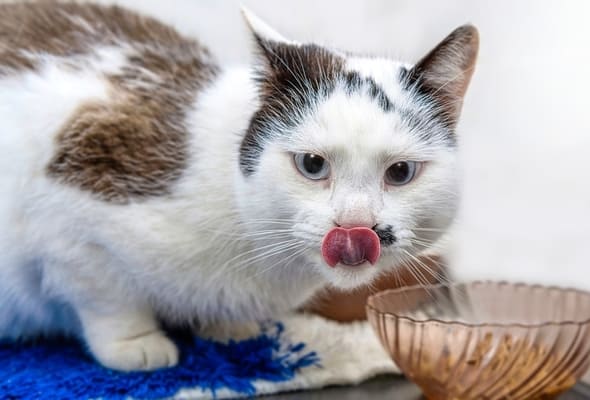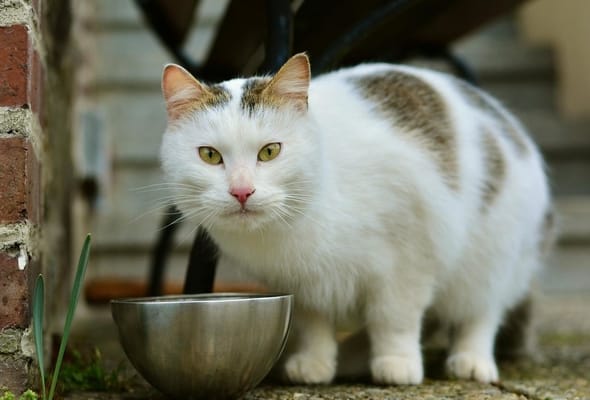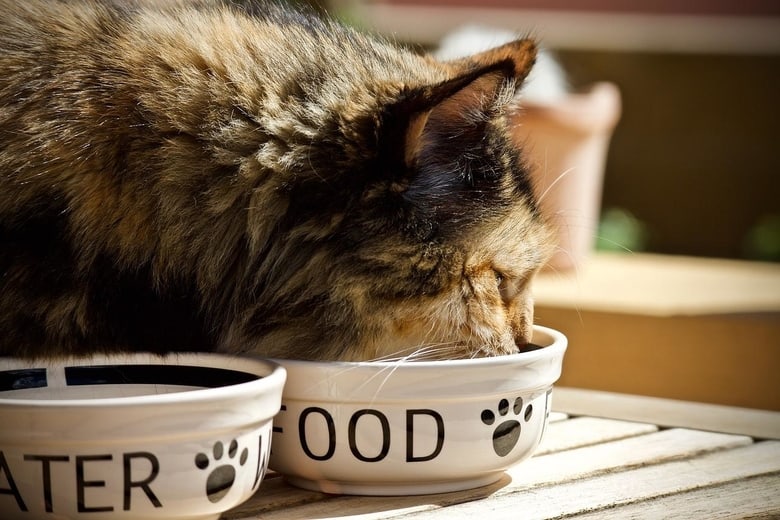In North America, obesity is the most common preventable disease amongst cats. Approximately 30-35% of the general feline population is obese, with 50% of cats aged 5-11 years old exceeding their ideal weight.
Obese cats incur considerable health risks, including shortened life spans. There’s no question that chubby cats are adorable, but if we want our feline friends to enjoy long, happy lives, we must prioritize their health.
The proliferation of plump kitties in our society raises the question, do cats know when to stop eating?
Do Cats Know When to Stop Eating?
While most cats do, some don’t. Much like human beings, some cats will only eat when they’re hungry and stop when they’re full, but others will eat for pleasure or boredom and aren’t able to regulate their food consumption.
Cats who have a propensity for overeating usually share some common behaviors. They may show aggression or be overprotective of their food bowl, especially around other pets. They might also rub up against your legs or try to command your attention whenever you are in the kitchen.
They can exhibit signs of impatience around mealtimes, hovering around their feeding area, or vocalizing more loudly than usual.
They may also attempt to involve themselves in any type of food preparation you undertake, climbing onto the countertops when you’re preparing meals or pleading for bites of your food.
Many factors may contribute to a cat’s tendency to overeat, and we will elaborate upon those shortly. In the meantime, there are ways you can begin to manage a cat who has become greedy.
The first step is understanding that cats will repeat whatever behavior gets rewarded. If you give in every time they whine or beg for food, they will naturally keep doing it. An alternative to indulging your cat’s whims with treats is to engage them in play.
Just like us, cats will eat out of sheer boredom and rarely turn down a tasty treat, so begin by eliminating the possibility that they are just in need of stimulation.
Why Does My Cat Eat So Much?
There are a myriad of reasons your cat may be overeating. Much like our food, cat food has become increasingly addictive. Different varieties may contain artificial flavors to make the food more appealing and cause the cat to continue munching long after their stomach is full.

Additionally, companies utilize a product known as ‘animal digest’, which enhances the taste of dry pet foods and increases palatability.
It has been suggested that cats can even become addicted to the specific shape of the treats and kibble they consume, which is why different companies utilize different shapes.
Some cats eat out of stress. Stress in cats is usually triggered by a drastic change such as moving or the introduction of new pets or people to the household.
Other significant contributors to feline stress include vet visits, significant changes in daily routine, and environments that are too disruptive or noisy. If your cat’s overeating is a recent development, it is worth considering whether any of the above could be a factor.
Boredom and loneliness are also common causes of feline overeating. If you have had a life or job change that means you aren’t home as much or are otherwise unable to spend as much time with your cat as you used to, make sure they have plentiful toys to keep their minds and bodies active when you’re not around.
What Happens if a Cat Overeats?
Cat’s stomachs have been described as ‘roughly the size of a ping-pong ball’ and can hold approximately two tablespoons of food. No wonder it’s so easy for them to overeat!

The immediate consequence of your cat overeating is an upset stomach, which may result in vomiting or diarrhea. Longer-term, a cat who consistently overeats will be at risk of obesity and a decreased life expectancy, not to mention a variety of diseases.
Obesity predisposes cats to glucose intolerance and diabetes, reproductive compromise, skin conditions, lameness, urinary tract infections, hepatic lipidosis (also known as fatty liver syndrome), and immuno-incompetence.
There are ways to manage feline obesity, but prevention is always better than cure. It is advisable to consult with a veterinary professional for the most up-to-date and thorough diet guidance for overweight and obese cats, or cats who are demonstrating a tendency to overeat.
How Often Should I Feed My Cat?
Opinions vary regarding whether one should feed cats incrementally throughout the day, or adhere to strict meal times. The advantage of mealtimes is that food intake can be closely monitored, and it is easy to ascertain if your cat has had a change in appetite.
According to experts at the Cornell Feline Health Centre, kittens should be fed up to three meals a day, while cats who are one year or older may only need to be fed once or twice a day.
It is also worth considering the quality of your cat’s food, as overeating can be a sign that they are not getting the nutrients their bodies need. Additionally, you can utilize a slow feeder bowl, which is a food-dispenser specifically designed to slow your cat’s consumption.
Should I Leave Food Out for My Cat All Day?
This method, known as free-feeding, can be controversial. Some owners state that their cats prefer to graze and rarely finish their meals all at once.
The key to successful free-feeding that doesn’t lead to overeating is to measure out the food, ensuring it does not exceed the recommended daily serving.
It is essential that, when free-feeding, you do not refill your cat’s food supply as soon as it is empty. This is a sure-fire way to ensure your kitty packs on the pounds. It is essential to properly measure out the day’s food and prevent your cat from overindulging.
An alternative is mixed feeding, which involves serving canned food as a twice-daily meal, while dry food is freely available. This allows the cat to eat on their own schedule while still enabling you to monitor their intake.
As with free-feeding, it is important to accurately measure the dry food out to ensure your cat is not consuming more than their recommended daily intake.
Conclusion
In summation, cats are very complex creatures. Like humans, some simply eat to live, listen to their bodies when they’re full, and go their entire lives without ever struggling with issues regarding their weight.
Others, however, seem to live to eat, hardly able to contain themselves at the snap of a tuna can. If your cat frequently overeats, it is necessary to examine whether they may be bored or stressed, or whether they’ve simply been given too much access to tasty and addictive food.

